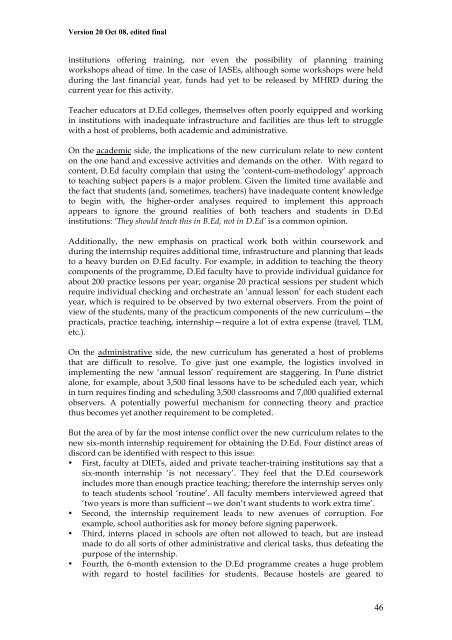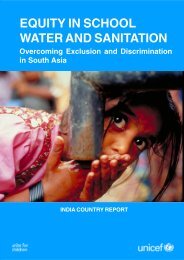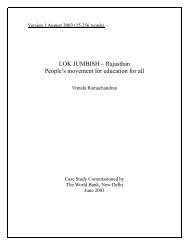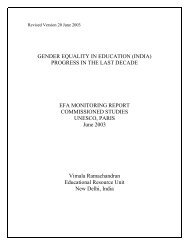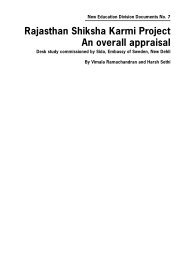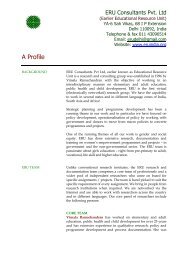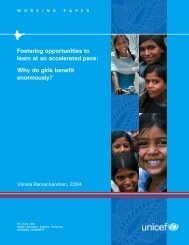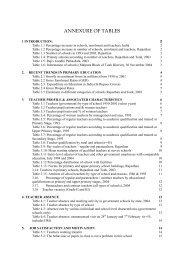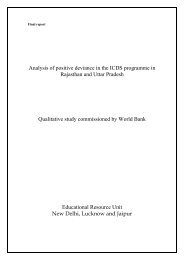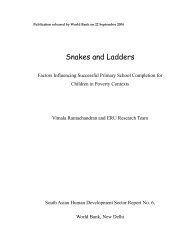primary school teachers the twists and turns of everyday practice
primary school teachers the twists and turns of everyday practice
primary school teachers the twists and turns of everyday practice
You also want an ePaper? Increase the reach of your titles
YUMPU automatically turns print PDFs into web optimized ePapers that Google loves.
Version 20 Oct 08, edited final<br />
institutions <strong>of</strong>fering training, nor even <strong>the</strong> possibility <strong>of</strong> planning training<br />
workshops ahead <strong>of</strong> time. In <strong>the</strong> case <strong>of</strong> IASEs, although some workshops were held<br />
during <strong>the</strong> last financial year, funds had yet to be released by MHRD during <strong>the</strong><br />
current year for this activity.<br />
Teacher educators at D.Ed colleges, <strong>the</strong>mselves <strong>of</strong>ten poorly equipped <strong>and</strong> working<br />
in institutions with inadequate infrastructure <strong>and</strong> facilities are thus left to struggle<br />
with a host <strong>of</strong> problems, both academic <strong>and</strong> administrative.<br />
On <strong>the</strong> academic side, <strong>the</strong> implications <strong>of</strong> <strong>the</strong> new curriculum relate to new content<br />
on <strong>the</strong> one h<strong>and</strong> <strong>and</strong> excessive activities <strong>and</strong> dem<strong>and</strong>s on <strong>the</strong> o<strong>the</strong>r. With regard to<br />
content, D.Ed faculty complain that using <strong>the</strong> ‘content-cum-methodology’ approach<br />
to teaching subject papers is a major problem. Given <strong>the</strong> limited time available <strong>and</strong><br />
<strong>the</strong> fact that students (<strong>and</strong>, sometimes, <strong>teachers</strong>) have inadequate content knowledge<br />
to begin with, <strong>the</strong> higher-order analyses required to implement this approach<br />
appears to ignore <strong>the</strong> ground realities <strong>of</strong> both <strong>teachers</strong> <strong>and</strong> students in D.Ed<br />
institutions: ‘They should teach this in B.Ed, not in D.Ed’ is a common opinion.<br />
Additionally, <strong>the</strong> new emphasis on practical work both within coursework <strong>and</strong><br />
during <strong>the</strong> internship requires additional time, infrastructure <strong>and</strong> planning that leads<br />
to a heavy burden on D.Ed faculty. For example, in addition to teaching <strong>the</strong> <strong>the</strong>ory<br />
components <strong>of</strong> <strong>the</strong> programme, D.Ed faculty have to provide individual guidance for<br />
about 200 <strong>practice</strong> lessons per year; organise 20 practical sessions per student which<br />
require individual checking <strong>and</strong> orchestrate an ‘annual lesson’ for each student each<br />
year, which is required to be observed by two external observers. From <strong>the</strong> point <strong>of</strong><br />
view <strong>of</strong> <strong>the</strong> students, many <strong>of</strong> <strong>the</strong> practicum components <strong>of</strong> <strong>the</strong> new curriculum—<strong>the</strong><br />
practicals, <strong>practice</strong> teaching, internship—require a lot <strong>of</strong> extra expense (travel, TLM,<br />
etc.).<br />
On <strong>the</strong> administrative side, <strong>the</strong> new curriculum has generated a host <strong>of</strong> problems<br />
that are difficult to resolve. To give just one example, <strong>the</strong> logistics involved in<br />
implementing <strong>the</strong> new ‘annual lesson’ requirement are staggering. In Pune district<br />
alone, for example, about 3,500 final lessons have to be scheduled each year, which<br />
in turn requires finding <strong>and</strong> scheduling 3,500 classrooms <strong>and</strong> 7,000 qualified external<br />
observers. A potentially powerful mechanism for connecting <strong>the</strong>ory <strong>and</strong> <strong>practice</strong><br />
thus becomes yet ano<strong>the</strong>r requirement to be completed.<br />
But <strong>the</strong> area <strong>of</strong> by far <strong>the</strong> most intense conflict over <strong>the</strong> new curriculum relates to <strong>the</strong><br />
new six-month internship requirement for obtaining <strong>the</strong> D.Ed. Four distinct areas <strong>of</strong><br />
discord can be identified with respect to this issue:<br />
• First, faculty at DIETs, aided <strong>and</strong> private teacher-training institutions say that a<br />
six-month internship ‘is not necessary’. They feel that <strong>the</strong> D.Ed coursework<br />
includes more than enough <strong>practice</strong> teaching; <strong>the</strong>refore <strong>the</strong> internship serves only<br />
to teach students <strong>school</strong> ‘routine’. All faculty members interviewed agreed that<br />
‘two years is more than sufficient—we don’t want students to work extra time’.<br />
• Second, <strong>the</strong> internship requirement leads to new avenues <strong>of</strong> corruption. For<br />
example, <strong>school</strong> authorities ask for money before signing paperwork.<br />
• Third, interns placed in <strong>school</strong>s are <strong>of</strong>ten not allowed to teach, but are instead<br />
made to do all sorts <strong>of</strong> o<strong>the</strong>r administrative <strong>and</strong> clerical tasks, thus defeating <strong>the</strong><br />
purpose <strong>of</strong> <strong>the</strong> internship.<br />
• Fourth, <strong>the</strong> 6-month extension to <strong>the</strong> D.Ed programme creates a huge problem<br />
with regard to hostel facilities for students. Because hostels are geared to<br />
46


